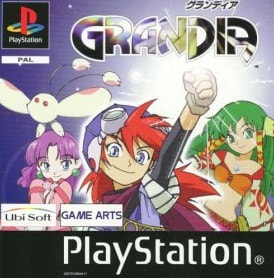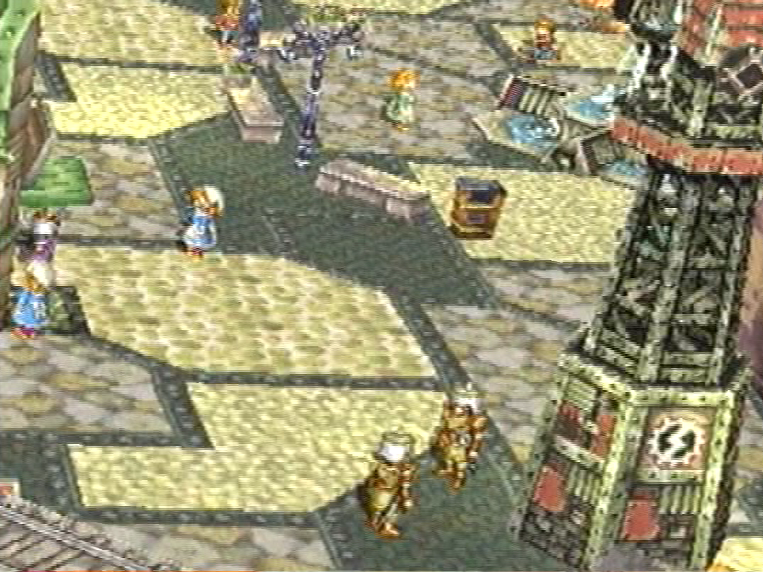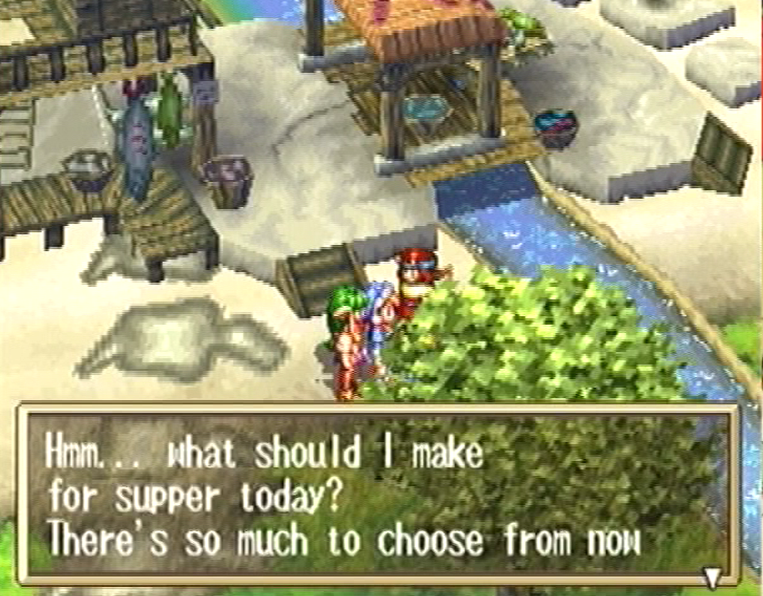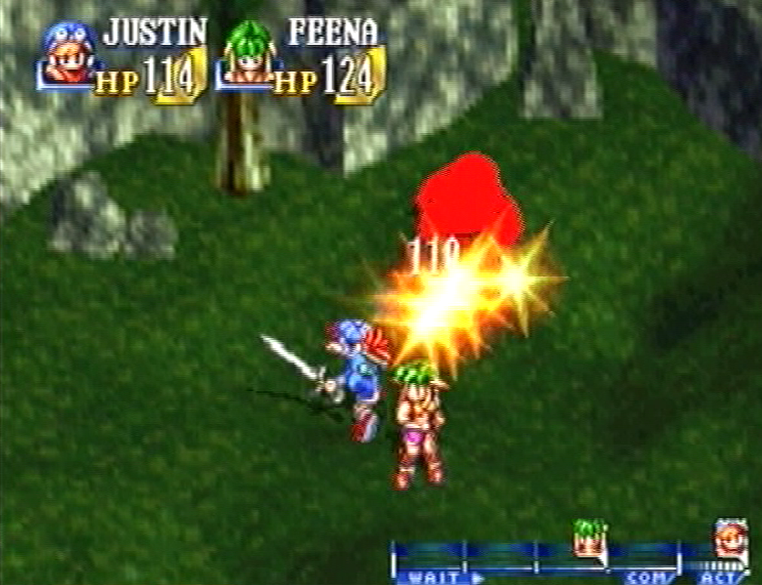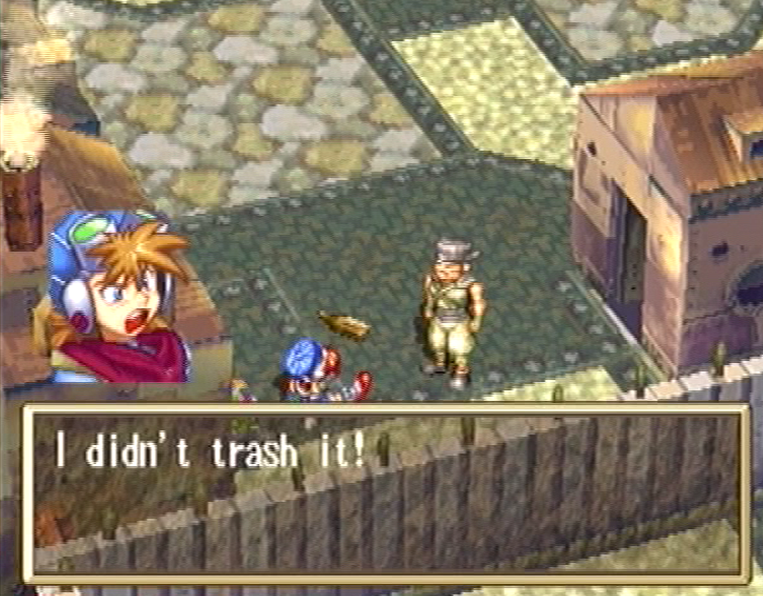GRANDIA (PS)
From Square’s juggernaut Final Fantasy games, to Konami’s cult-classic Suikoden, to sleeper hits such as Parasite Eve and Alundra. If you love RPGs, chances are one of your favourites appeared on the original PlayStation. But there’s one title which stood above the rest, cutting through the chaff to stand toe-to-toe with the system’s best, from a studio who had developed the critically acclaimed Lunar series beforehand. That game is Grandia, and despite its outdated exterior, it’s one of the finest games on the system.
Justin is a young lad from the port town of Parm. He wishes to emulate his late father in becoming an adventurer, which sees him causing trouble for his mother Lily and childhood friend Sue. But when an archaeological site seemingly houses information that can shed light on the mysterious, collapsed Angelou civilisation, Justin sees it as a chance to begin his first adventure, one which ultimately sees him cross the world, as the stakes ramp up with every stop. Along the way, he teams with the likes of fellow adventurer Feena, knight Gadwin and a host of other characters. Grandia’s story seems straightforward – it’s about a boy craving adventure – but it builds beautifully towards a darker, mature plot while avoiding unnecessary filler.
This is in part due to its fantastic cast of characters. Justin makes for one of the most likable JRPG protagonists, partly due to his childish charm, but also in watching him develop and mature over the course of his journey. Sue, along with adorable sidekick Puffy, makes a great foil for Justin’s narrow-headed antics at the start. Everyone you meet throughout the course of the game receives ample time for development and seeing characters happy, sad or in dark times has you feeling every emotion with them. Twists catch you off guard, departures will bring a tear to the eye, and triumphs will have you celebrating too. It’s a tour de force that balances emotional weight with light-hearted drama that avoids brooding, while still managing to take itself seriously.
From Square’s juggernaut Final Fantasy games, to Konami’s cult-classic Suikoden, to sleeper hits such as Parasite Eve and Alundra. If you love RPGs, chances are one of your favourites appeared on the original PlayStation. But there’s one title which stood above the rest, cutting through the chaff to stand toe-to-toe with the system’s best, from a studio who had developed the critically acclaimed Lunar series beforehand. That game is Grandia, and despite its outdated exterior, it’s one of the finest games on the system.
Justin is a young lad from the port town of Parm. He wishes to emulate his late father in becoming an adventurer, which sees him causing trouble for his mother Lily and childhood friend Sue. But when an archaeological site seemingly houses information that can shed light on the mysterious, collapsed Angelou civilisation, Justin sees it as a chance to begin his first adventure, one which ultimately sees him cross the world, as the stakes ramp up with every stop. Along the way, he teams with the likes of fellow adventurer Feena, knight Gadwin and a host of other characters. Grandia’s story seems straightforward – it’s about a boy craving adventure – but it builds beautifully towards a darker, mature plot while avoiding unnecessary filler.
This is in part due to its fantastic cast of characters. Justin makes for one of the most likable JRPG protagonists, partly due to his childish charm, but also in watching him develop and mature over the course of his journey. Sue, along with adorable sidekick Puffy, makes a great foil for Justin’s narrow-headed antics at the start. Everyone you meet throughout the course of the game receives ample time for development and seeing characters happy, sad or in dark times has you feeling every emotion with them. Twists catch you off guard, departures will bring a tear to the eye, and triumphs will have you celebrating too. It’s a tour de force that balances emotional weight with light-hearted drama that avoids brooding, while still managing to take itself seriously.
From play fights with pots 'n' pans, Justin ends up crossing the ends of the world and fighting to save it, as well as those he loves.
Grandia’s world is also a joy to explore. While not quite as open as some of its peers, the varied and engaging locales will surprise you. Highlights include exploring a ghostly pirate ship, scaling a seemingly endless wall of sliding paths and getting lost in a thick jungle with oversized flora that dwarf our heroes. Towns often serve as not only a chance to rest, save and restock, but also embrace a new culture. Parm’s rustic charm and lively atmosphere is in stark contrast to the misty, isolated Luc village. Exploration rewards items and experience as well as more background on every locale. And just when you think Grandia has shown all it can offer, a new part of the world opens up. It’s genuinely a delight exploring Elencia.
Of course, combat is a necessity for a large chunk of your time with Grandia, but like FFVII, its systems remain remarkable even to this day. Monsters roam freely around the map, initiating battle once contact is made as opposed to random battles. This alone has depth: you can start the battle with a pre-emptive advantage if you can sneak behind enemies, but equally will begin at a disadvantage if caught from behind. Once on the field, battles utilise traditional turn-based mechanics, but with a twist. A meter at the bottom governs when you can attack, when foes can attack and who gets the next move. Characters can block, utilise physical strikes and magic. The meter’s IP stage allows you to intercept enemy attacks, with a chance to cancel their move by striking first. It’s a simple, yet supremely effective, system. The lack of random encounters, as well as offering a smooth challenge curve, allows combat to flowing beautifully.
Grandia boasts a whole host of remarkable systems and mechanics. The camera is noteworthy, allowing you to rotate freely and often discover new passageways otherwise obscured. It also serves to showcase key moments throughout the game. Character development is also exemplary: along with a traditional XP system, you can upgrade skills and magic with repeated use. This unlocks better attacks, stronger magic as well as combination magics, all of which increase stats to your character roster. This allows heroes to wield multiple weapon types such as axes, maces, bows and whips. It’s deep and engrossing. Grandia is traditional at points, yet has enough refinements and additions to help carve a unique identity amongst its peers.
Of course, combat is a necessity for a large chunk of your time with Grandia, but like FFVII, its systems remain remarkable even to this day. Monsters roam freely around the map, initiating battle once contact is made as opposed to random battles. This alone has depth: you can start the battle with a pre-emptive advantage if you can sneak behind enemies, but equally will begin at a disadvantage if caught from behind. Once on the field, battles utilise traditional turn-based mechanics, but with a twist. A meter at the bottom governs when you can attack, when foes can attack and who gets the next move. Characters can block, utilise physical strikes and magic. The meter’s IP stage allows you to intercept enemy attacks, with a chance to cancel their move by striking first. It’s a simple, yet supremely effective, system. The lack of random encounters, as well as offering a smooth challenge curve, allows combat to flowing beautifully.
Grandia boasts a whole host of remarkable systems and mechanics. The camera is noteworthy, allowing you to rotate freely and often discover new passageways otherwise obscured. It also serves to showcase key moments throughout the game. Character development is also exemplary: along with a traditional XP system, you can upgrade skills and magic with repeated use. This unlocks better attacks, stronger magic as well as combination magics, all of which increase stats to your character roster. This allows heroes to wield multiple weapon types such as axes, maces, bows and whips. It’s deep and engrossing. Grandia is traditional at points, yet has enough refinements and additions to help carve a unique identity amongst its peers.
Grandia's battle system is one of the strongest on the PlayStation, and its towns some of the most enjoyable to explore
The only area in which Grandia perhaps falters is in its visuals. A port of a 1997 SEGA Saturn game, its easy to see how it was considered dated when it would hit PAL shores in 2000. It’s not all bad though: the bright colour palette, fantastic animated cut-scenes and range of monsters are pretty impressive, but the dated sprite work, lacklustre battle backgrounds and general chugginess of performance can put a damper on the look of the game. Though not as garish as some of the earlier 3D efforts on the PlayStation, Grandia still has a generally dated look. The sound fares better, particularly in regards to the brilliant soundtrack which utilises a range of instruments. From the epic opening score, to the welcoming Parm theme which leans on bagpipes, there’s bound to be a track which sticks with you. The voice work and translation are, admittedly, spotty, but there’s a goofy charm to the stiff readings. The sound effects work pretty well, though can suffer from compression.
Grandia, like its title implies, is an epic-sized game. Just to reach the end, you can expect a 70 hour journey. Along with the main story, several hidden dungeons are available, including the unsettling and spooky Castle of Dreams. This can easily add more time, making Grandia one of the largest JRPGs on the system.
Ultimately, there are not enough positives to describe Grandia. It’s an epic, engrossing and entertaining adventure that hooks you and won’t let go. With a remarkable cast of likable characters, one of the most refined combat systems in the genre’s history and a large and charming world to uncover, Grandia is a phenomenal experience from start to finish. While it may lack the visual pizazz of games likes Final Fantasy VII, it arguably has the most heart of any JRPG on the system. For pure gameplay and story, Grandia may be unrivalled in its excellence. If you somehow missed this JRPG gem, seek it out immediately.
Grandia, like its title implies, is an epic-sized game. Just to reach the end, you can expect a 70 hour journey. Along with the main story, several hidden dungeons are available, including the unsettling and spooky Castle of Dreams. This can easily add more time, making Grandia one of the largest JRPGs on the system.
Ultimately, there are not enough positives to describe Grandia. It’s an epic, engrossing and entertaining adventure that hooks you and won’t let go. With a remarkable cast of likable characters, one of the most refined combat systems in the genre’s history and a large and charming world to uncover, Grandia is a phenomenal experience from start to finish. While it may lack the visual pizazz of games likes Final Fantasy VII, it arguably has the most heart of any JRPG on the system. For pure gameplay and story, Grandia may be unrivalled in its excellence. If you somehow missed this JRPG gem, seek it out immediately.
|
|
VERDICT
"Few RPGs, or indeed games, have the player as emotionally involved as Grandia. It may not be the finest looking game on the PlayStation, but for the sheer quality of its gameplay and its storyline, it may be unrivalled in its excellence" OVERALL: 10/10 |
